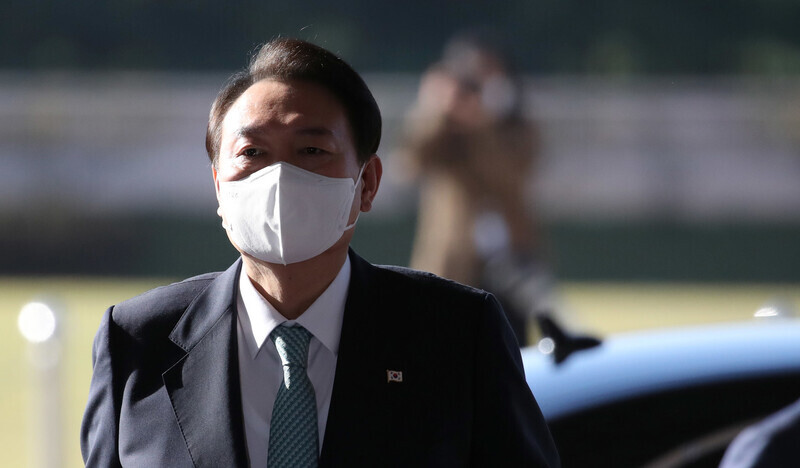hankyoreh
Links to other country sites 다른 나라 사이트 링크
[Column] Yoon’s dead-on-arrival diplomacy and a dire scenario for the Korean Peninsula


South Korean President Yoon Suk-yeol’s Southeast Asian tour was a diplomatic failure before he even left Korea. The same president who is constantly talking about “freedom” and “universal norms and values” barred a particular news outlet from sitting in on his presidential aircraft — covering everything about his trip with the thick grime of media repression.
Since returning, he has been going all out in his battle with the media, packaging his decision to exclude access to his aircraft as a matter of “defending the Constitution.” The statements that were issued during his tour, including a joint statement with the US and Japan in Phnom Penh and a “Korean Indo-Pacific strategy,” represent the biggest change in Seoul’s diplomatic course since the “Northern policy” in response to the end of the Cold War in the early 1990s.
Yet we see no sign of the president trying to explain all of this to the public or seek a popular consensus. It’s a deeply irresponsible approach.
The person paying the keenest attention to this supply diplomacy’s outcome is the “uninvited guest”: North Korean leader Kim Jong-un.
In the first in-person summit between US President Joe Biden and Chinese President Xi Jinping, the biggest differences of opinion between the two sides were over the North Korean nuclear and missile issues and Taiwan. The North Korean nuclear issue was also a source of tense disagreement at Xi’s summit with Yoon.
South Korea and the US sent the message that China needed to play an active role in resolving the North Korean nuclear issue, or else they would step up their curbs on China through trilateral military cooperation with Japan. China responded by emphasizing Pyongyang’s “legitimate concerns,” stressing that they first needed to stop their deployment of strategic US weapons and joint military exercises.
Shortly after seeing China’s defense of its position, North Korea proceeded on Friday with the test launch of a new Hwasong-17 intercontinental ballistic missile (ICBM) capable of striking the continental US. Attending the launch in person with his young daughter in tow, Kim sounded a note of confidence, declaring that the North would “react to nukes with nuclear weapons and to total confrontation with all-out confrontation.”
What might Kim be making of the state of the world today? In Russia’s invasion of Ukraine, he may see a return to the era of imperialism, where major powers invade their neighboring countries and regions to expand their territory and influence.
He may also see the effective collapse of the international order that might have prevented it, and the arrival of a new era where countries with empires and nuclear weapons can act as they please.
A particularly important matter is China’s changing strategy toward the Korean Peninsula. Baek Seung-wook, a professor at Chung-Ang University, has warned of how the Ukraine, Taiwan, and North Korean nuclear issues are interrelated.
“Since the Armistice Agreement was signed in the Korean War, China’s basic position on the Korean Peninsula had been to deter war. But now China seems to be abandoning the principle of denuclearization on the peninsula and using North Korea as a variable in connection with the Taiwan situation,” he concluded.
China’s “reunification” with Taiwan is something that Xi has made a pledge to his public to achieve — an issue that shores up the legitimacy of his rule. In the US-China summit on Nov. 18, he referred to the Taiwan issue as the “most central of China’s central interests” and the “paramount red line that must not be crossed in China-US relations.”
In keeping with this change in strategy, China has opted for a stronger alliance with North Korea over the North’s denuclearization.
If China does attempt to reunify with Taiwan, having two fronts — with North Korea posing a military threat to the South — would work in its favor in terms of fragmenting the US deterrent. We should take note of the complete absence of any reference to “denuclearization of the Korean Peninsula” in China’s announcements on its summits with South Korea and the US.
As the situation has shifted, North Korea has revised its nuclear strategy. Before the 2019 North Korea-US summit in Hanoi broke down without a deal being reached, Pyongyang’s nuclear weapon and missile tests had been part of a strategy to get Washington to negotiate.
But experts are warning that recent activities — including the North’s legislation of nuclear armament in September, its continued ballistic missile testing, and its drills with “tactical nuclear weapon units” — have to be seen as very worrying indications that its nukes are now more than just a war deterrent.
“From what we can see in technical terms with the North’s current development of tactical nuclear weapons, organization of units, and equipment, we should assume that it is developing and training for the ability to strike against South Korea and make preparations accordingly,” advised Lee Chun-geun, an emeritus research fellow at the Science and Technology Policy Institute and expert on nuclear weapons and missiles.
Is Kim gambling that once the North perfects its ICBM technology, the US will not be able to intervene against the use of tactical nuclear weapons against the South, due to the potential for the North’s ICBMs to strike against US territory? What choice would Washington make in the event of simultaneous crises in Taiwan and on the Korean Peninsula?
These dire scenarios are by no means unavoidable. The future depends on our ability to properly grasp the nature of the Korean Peninsula crisis and changes to the international order, and on our efforts to preserve peace.
But how are things actually unfolding?
Our president merely talks about “trilateral coordination” with the US and Japan as some kind of catchphrase, while showing no willingness or ability to consider a strategy for “taking advantage” of the US and Japan practically from South Korea’s standpoint. There are also no signs that the opposition is either confronting the reality of a fast-changing international order — where the old “solutions” to the North Korean nuclear issue no longer apply — or trying to come up with a practical alternative.
In South Korea, our diplomatic discourse has narrowed into partisan battles, where each side accuses the other of “allegiance” either to the US, China or Japan. We’ve lost sight of any discourse forum for working together to develop a long-term strategy from the larger perspective of South Korea.
Perhaps the most severe crisis right now is the way our window for responding to this existential crisis is closing as our society gets drawn into the noisy political battles of those in power.
Please direct questions or comments to [english@hani.co.kr]

Editorial・opinion
![[Column] Season 2 of special prosecutor probe may be coming to Korea soon [Column] Season 2 of special prosecutor probe may be coming to Korea soon](https://flexible.img.hani.co.kr/flexible/normal/500/300/imgdb/original/2024/0426/3317141030699447.jpg) [Column] Season 2 of special prosecutor probe may be coming to Korea soon
[Column] Season 2 of special prosecutor probe may be coming to Korea soon![[Column] Park Geun-hye déjà vu in Yoon Suk-yeol [Column] Park Geun-hye déjà vu in Yoon Suk-yeol](https://flexible.img.hani.co.kr/flexible/normal/500/300/imgdb/original/2024/0424/651713945113788.jpg) [Column] Park Geun-hye déjà vu in Yoon Suk-yeol
[Column] Park Geun-hye déjà vu in Yoon Suk-yeol- [Editorial] New weight of N. Korea’s nuclear threats makes dialogue all the more urgent
- [Guest essay] The real reason Korea’s new right wants to dub Rhee a founding father
- [Column] ‘Choson’: Is it time we start referring to N. Korea in its own terms?
- [Editorial] Japan’s rewriting of history with Korea has gone too far
- [Column] The president’s questionable capacity for dialogue
- [Column] Are chaebol firms just pizza pies for families to divvy up as they please?
- [Column] Has Korea, too, crossed the Rubicon on China?
- [Correspondent’s column] In Japan’s alliance with US, echoes of its past alliances with UK
Most viewed articles
- 1Is Japan about to snatch control of Line messenger from Korea’s Naver?
- 2‘We must say no’: Seoul defense chief on Korean, USFK involvement in hypothetical Taiwan crisis
- 3[News analysis] Using lure of fame, K-entertainment agency bigwigs sexually prey on young trainees
- 4[Column] Park Geun-hye déjà vu in Yoon Suk-yeol
- 5Will NewJeans end up collateral damage in internal feud at K-pop juggernaut Hybe?
- 6Up-and-coming Indonesian group StarBe spills what it learned during K-pop training in Seoul
- 7[Column] Season 2 of special prosecutor probe may be coming to Korea soon
- 8Korea’s 1.3% growth in Q1 signals ‘textbook’ return to growth, says government
- 9Report reveals toxic pollution at numerous USFK bases
- 10[Editorial] Statue should not be central concern of comfort women issue